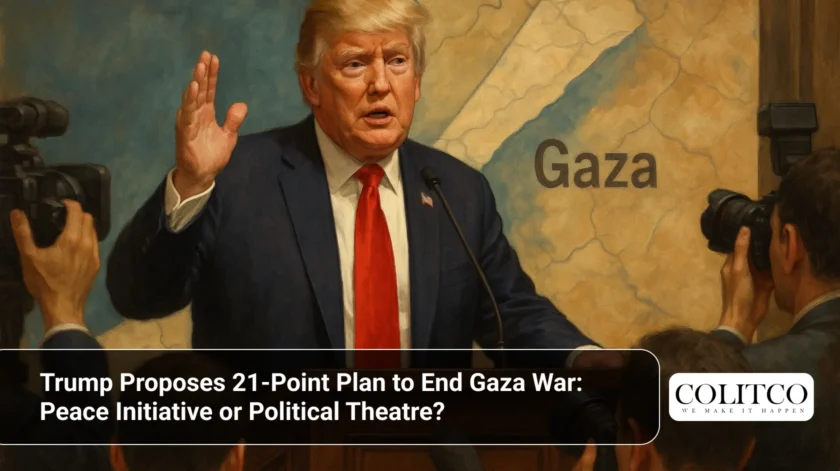President Donald Trump has positioned himself as the architect of Middle East peace once again. Standing alongside Israeli Prime Minister Benjamin Netanyahu at the White House on September 29, 2025, Trump unveiled an ambitious 21-point framework aimed at ending the Gaza conflict.
The plan’s centerpiece? A stark 72-hour ultimatum for Hamas to release all hostages.
But reactions suggest this initiative faces a rocky road ahead.
The 21-Point Gaza Peace Plan: Key Components
The comprehensive proposal outlines a multi-phase approach to ending hostilities and rebuilding Gaza. Here are the critical elements:
Immediate Actions:
- Hamas must release all hostages within 72 hours
- Complete disarmament of Hamas forces
- Transfer of governance to a transitional committee
- Establishment of a “Board of Peace” chaired by Trump himself
Long-Term Framework:
- Phased withdrawal of Israeli forces from Gaza
- Immediate humanitarian aid deployment
- Economic development initiatives funded by Arab nations
- No forced displacement of Palestinian civilians
- Potential pathway to Palestinian statehood discussions
Trump’s announcement emphasized Gaza would become “a deradicalized terror-free zone” that poses no threat to neighboring countries. The plan promises to redevelop the territory “for the benefit of the people of Gaza, who have suffered more than enough.”
“Today is a historic day for peace — and Prime Minister @netanyahu and I have just concluded an important meeting…we discussed how to end the war in Gaza, but it’s just a part of the bigger picture, which is peace in the Middle East.” – PRESIDENT DONALD J. TRUMP pic.twitter.com/5f9PF9EC3c
— The White House (@WhiteHouse) September 29, 2025
Netanyahu’s Endorsement and Warning
Israeli Prime Minister Netanyahu threw his weight behind the initiative. However, he issued a clear warning to Hamas: accept the terms or face unilateral Israeli action.
“Israel stands ready to implement this plan,” Netanyahu stated. “But make no mistake – if Hamas rejects this opportunity, we will act decisively to protect our citizens.”
The Israeli leader’s dual message signals both diplomatic flexibility and military readiness. Critics argue this approach leaves little room for genuine negotiation.
Arab Nations Step Forward
In a significant diplomatic development, several Arab states have pledged concrete support for the peace plan.
Saudi Arabia, Jordan, Egypt, and the United Arab Emirates committed to three critical roles:
- Demilitarizing Gaza through military oversight
- Funding reconstruction efforts with billions in development aid
- Deploying stabilization forces to maintain security
This regional backing lends credibility to the initiative. It also reflects growing Arab frustration with Hamas and desire for regional stability.
The question remains whether these nations can deliver on promises while navigating complex domestic politics.
Trump: “Israel agreed to my plan. All Arab countries agreed. If Hamas refuses, Israel has my full support to finish the job.” pic.twitter.com/5QAFVFzft9
— Dr. Eli David (@DrEliDavid) September 29, 2025
The Controversial “Board of Peace”
Perhaps the most eyebrow-raising element of the plan is the proposed “Board of Peace.”
Trump will chair this international oversight body, which reportedly includes former British Prime Minister Tony Blair. The announcement sparked immediate mockery and skepticism on social media.
“The Board of Peace will be headed, not at my request, by a gentleman known as President Donald J. Trump,” the President announced with characteristic flair.
Critics quickly questioned whether Trump’s polarizing persona makes him suitable for such a role. Others noted Blair’s controversial involvement in the Iraq War as particularly tone-deaf.
One social media user quipped: “Doubters of this plan when Tony Blair turns Gaza into the middle eastern Singapore, overthrows the Board of Peace, has himself declared the Caliph of the Third Way Caliphate.”
The satirical comment captures widespread cynicism about the initiative’s viability.
International Reactions: Support and Skepticism
World leaders offered mixed responses to the announcement.
French President Emmanuel Macron voiced cautious support, tweeting: “I welcome President Trump’s commitment to end the war in Gaza and secure the release of all hostages. I hope Israel commits firmly to this basis.”
However, pro-Palestinian activists and progressive politicians responded with harsh criticism.
Green Party leader Dr. Jill Stein dismissed the proposal outright: “Sorry. Trump’s peace plan doesn’t pass the laugh test.”
Peace activist Medea Benjamin went further, calling it “not a peace plan. It is a demand of surrender to the colonial/imperial powers.”
These reactions highlight the deep political divisions surrounding any Gaza peace initiative. Trump’s involvement appears to deepen rather than bridge those divides.
🚨 HAPPENING NOW OUTSIDE OF THE WHITE HOUSE 🚨
Anti-Trump, pro-Hamas protesters are currently threatening President Trump’s life outside the White House by chanting, “Long live the intifada! Globalize the intifada. Donald Trump, we are at your gate.”
They are threatening to… pic.twitter.com/jKvlcpyXrA
— Laura Loomer (@LauraLoomer) September 29, 2025
What Hamas Hasn’t Said
Notably absent from the announcement was any response from Hamas leadership.
The 72-hour ultimatum creates immediate pressure. But Hamas has historically rejected similar demands without credible security guarantees and political recognition.
Palestinian observers note the plan lacks input from Palestinian civil society. This top-down approach mirrors previous failed peace initiatives that ignored Palestinian agency.
The Feasibility Question
Can this plan actually work? Several experts express doubt.
The 72-hour timeline for hostage release appears unrealistic. Hamas has used hostages as leverage for months and won’t easily surrender this bargaining chip.
The proposed demilitarization of Gaza requires Hamas to effectively dissolve itself. Without alternative security arrangements or political representation, Hamas leaders have little incentive to comply.
The economic promises sound appealing. But previous reconstruction efforts in Gaza have faltered due to Israeli restrictions, corruption, and continued hostilities.
Most significantly, the plan doesn’t address core Palestinian demands: ending the occupation, right of return, and genuine self-determination.
Historical Context: Why Peace Plans Fail
This isn’t the first ambitious Middle East peace plan Trump has proposed.
His administration previously unveiled the “Peace to Prosperity” plan in 2020. That initiative was rejected by Palestinians and never gained traction.
The Oslo Accords, Camp David Summit, and numerous other efforts over decades have failed to resolve the Israeli-Palestinian conflict. Each collapsed over issues of trust, security, settlements, Jerusalem’s status, and refugee rights.
Today’s announcement follows over a year of devastating conflict. The human toll includes tens of thousands of Palestinian deaths and the October 7 attack that killed 1,200 Israelis.
This context makes genuine peace even more elusive. Both sides harbor deep grievances and distrust.
What Happens Next
The 72-hour countdown has begun. Hamas faces an impossible choice: surrender unconditionally or face military action.
Most analysts predict Hamas will reject the ultimatum. This would give Israel political cover for continued operations while allowing Trump to claim he tried for peace.
Arab nations may proceed with humanitarian initiatives regardless of Hamas’s response. Economic development could continue in phases as security situations permit.
The Board of Peace’s actual authority remains unclear. International oversight bodies often lack enforcement mechanisms and become symbolic rather than effective.
The Bigger Picture
This peace plan arrives amid Trump’s broader foreign policy agenda. The President seeks diplomatic wins as the 2026 midterm elections approach.
For Netanyahu, the initiative provides international legitimacy for military operations. He can point to rejected peace offers while pursuing security objectives.
Arab states gain Western approval for regional leadership roles. They position themselves as moderate voices while potentially gaining influence in Gaza’s future.
Palestinians, however, appear to be the plan’s objects rather than subjects. Their voices and aspirations receive little consideration in this framework.
The Bottom Line
Trump’s 21-point peace plan represents ambitious diplomacy or political posturing, depending on one’s perspective.
President Donald J. Trump’s Comprehensive Plan to End the Gaza Conflict:
1. Gaza will be a deradicalized terror-free zone that does not pose a threat to its neighbors.
2. Gaza will be redeveloped for the benefit of the people of Gaza, who have suffered more than enough.
3. If… pic.twitter.com/veqhr9MW28
— Rapid Response 47 (@RapidResponse47) September 29, 2025
The initiative offers concrete commitments from Israel and Arab states. It addresses humanitarian concerns and proposes economic development.
But without Palestinian buy-in, realistic timelines, and enforcement mechanisms, the plan faces steep odds.
History suggests Middle East peace requires patient negotiation, mutual trust-building, and addressing root causes of conflict. Whether this latest initiative can overcome decades of failed attempts remains to be seen.
For now, the world watches as the 72-hour clock ticks down. The coming days will reveal whether this peace plan marks a genuine breakthrough or another footnote in the long, tragic history of the Israeli-Palestinian conflict.
Also Read: RBA Rate Cut Decision: Why September’s Meeting Could Dash Hopes for Immediate Relief
FAQs
Q: What is the 21-Point Gaza Peace Plan?
A: It’s a comprehensive framework proposed by President Trump requiring Hamas to release hostages, disarm, and transfer governance to a transitional committee overseen by a “Board of Peace” chaired by Trump.
Q: Will Hamas accept the 72-hour ultimatum?
A: Most analysts believe Hamas will reject the terms, as the plan effectively requires the organization to dissolve without security guarantees or political recognition.
Q: What role will Arab nations play?
A: Saudi Arabia, Jordan, Egypt, and the UAE have committed to demilitarizing Gaza, funding reconstruction, and deploying stabilization forces.
Q: Could this plan actually bring peace?
A: Experts express skepticism due to the short timeline, lack of Palestinian input, and absence of mechanisms addressing core issues like occupation, settlements, and self-determination.
Q: What happens if Hamas rejects the plan?
A: Israel has indicated it will act unilaterally, likely continuing military operations while citing rejected peace offers as justification.












